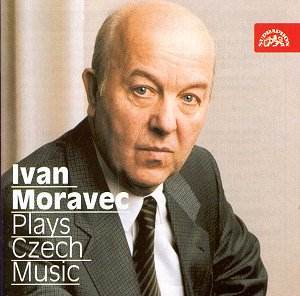There has been a welcome resurgence of interest in
the art of Ivan Moravec of late. One of Philips’ ‘Great Pianists of
the Century’, this and other more recent releases have brought his pianism
to the attention of those perhaps only imperfectly aware that he is
one of the master pianists of our age. This Supraphon CD of material
taped in 1962 and 1984 was released in 2000, the year of Moravec’s seventieth
birthday. The following year I saw him in the Queen Elizabeth Hall,
playing Chopin in a recital of characteristic modesty and unspectacular
greatness. He stands now with Jan Herman and Rudolf Firkusny in the
triumvirate of the greatest Czech pianists to have recorded and this
disc gives yet more evidence of his colouristic sensitivity, tonal beauty
and musical buoyancy.
The Smetana A Minor Polka is played with lilting affection
and with a flexibility of rubato that never slides into the flaccid.
The piece has a simple but not simplistic melodic appeal and Moravec
can either glitteringly harden his tone when necessary or bathe passages
in half-lights of almost spectral beauty. He catches the delicacy and
the dreaminess of Hulan (The Lancer) from the 1879 Czech Dances
laced as it is with something of the nostalgia of Schumann. The variations
are in Moravec’s hands decorative flecks in the right hand whilst the
lift is strong and even, dynamically gradient and noble. Obkrocak
is convulsively exuberant and the Furiant if anything even more dramatically
successful a conception. At 1’30 Moravec leans on the right hand passages
slightly; the effect is one of infinite rhythmic elasticity far removed
from mannerism. He is capable of tremendous depth of unforced tone –
never hardening or becoming brittle and as here the effect is one of
drama and excitement. He infuses the G Minor Polka with an appropriate
sense of theatricality and a secure sense of rubato whilst Memories
of Plzen, one of the weaker pieces, is still prettily insistent.
When he turns to Suk he does so with acute sensitivity. His O Matince
displays a wealth of characteristic virtues. He is not over inclined
to linger – he is significantly fleeter and less dreamy than Slovak
pianist Marian Lapsansky on a rival disc for example. In the first of
the cycle of five he eschews sentimentality and promotes instead a simple
gravity of utterance; the adagio has a surging, verdant freshness to
it, its slight air of melancholy subsumed into the patina of Moravec’s
lyricism. The uniform depth of his bass in the third, How Mother
sang at night to the sick child, is a subtly ominous foreshadowing
of the next, Mother’s Heart. Moravec never draws attention to
the programmatic nature – or at least to the descriptive nature of the
movement’s titles – but instead lets the music grow from within;
in the last piece, Remembrance, he is by turns, and wholly sensitively,
agitated, sonorous, veiled and regretful.
He plays the Humoresque with requisite flourish – it’s
an immature, rather fin de siècle piece whereas Pisen lasky
is also one of Suk’s early works and one of his most famous. Moravec
stabs away at the insistent bass notes that run throughout, tying the
work securely to something rather more than mere effulgent ardour. His
rubato is at the service of the work’s moods, his tone unselfconsciously
ravishing. Korte’s Sonata was composed between 1951-53 and a prizewinner
at the Bolzano Competition. Opening in stentorian fashion a neo-baroque
passage intervenes which itself relaxes into a romanticised episode
that winds down before a return to the opening brittle flourish. Elements
of conjunction and opposition pervade the second of the two movements
– strident neo-baroque once again but here undergoing a process of translation.
The triumphant baroque theme resurfaces once more in an intriguing procedural
development; this makes the work sound far more mannered and artificial
than it actually is and Moravec’s advocacy speaks of his own admiration.
All but O Matince derive from a live
recording at the Dvořák Hall of the Rudolfinum in 1984; the audience
is commendably silent, except for occasional applause, though Moravec’s
guttural commentary, a kind of wounded yelp, is also audible at one
or two moments. The disc has been beautifully transferred and
enshrines yet more testimony to Moravec’s exalted status amongst contemporary
musicians.
Jonathan Woolf
